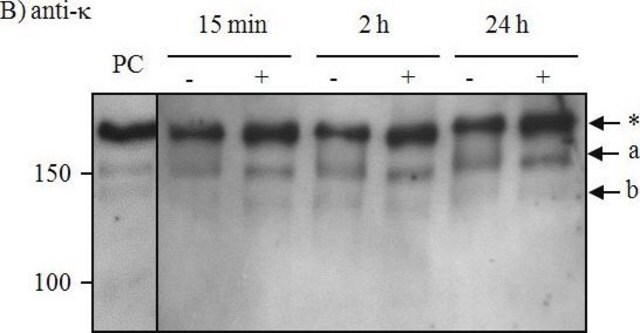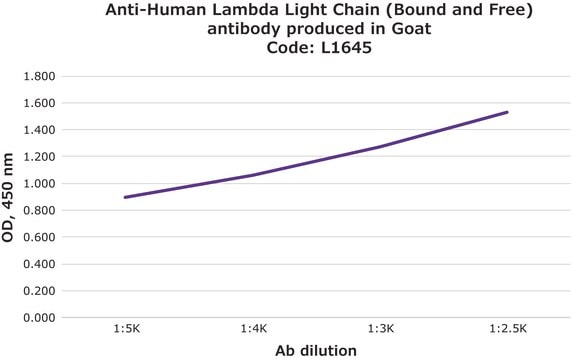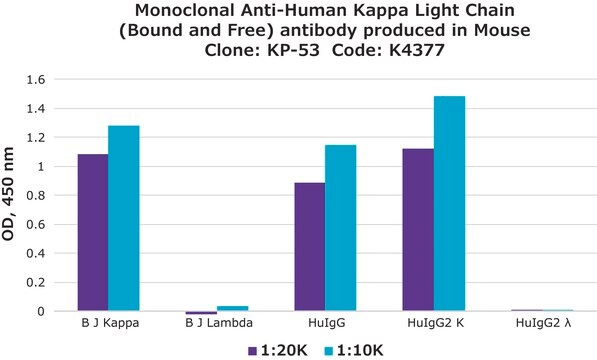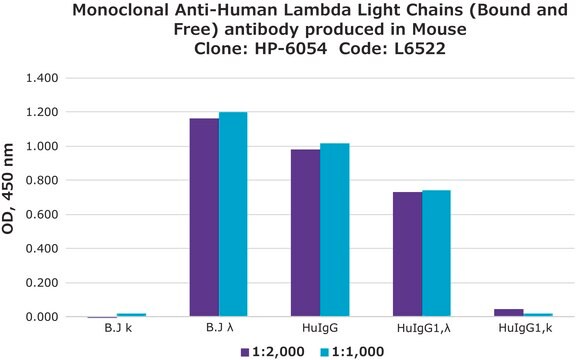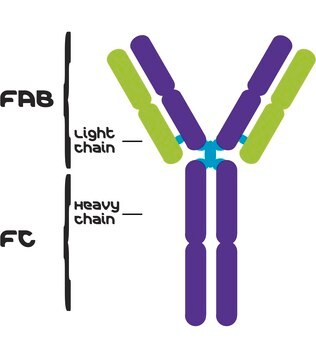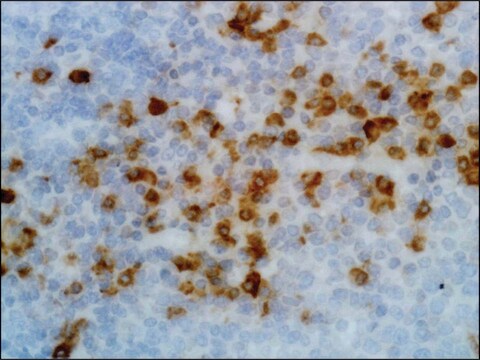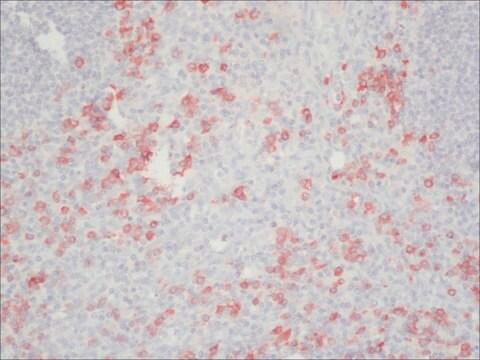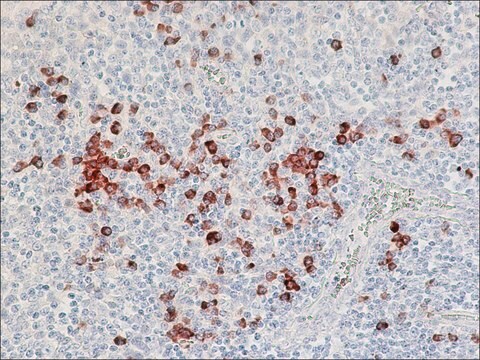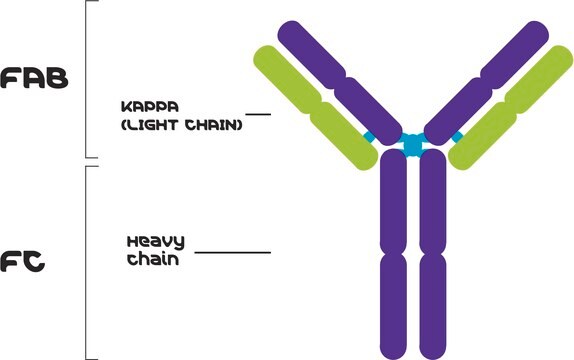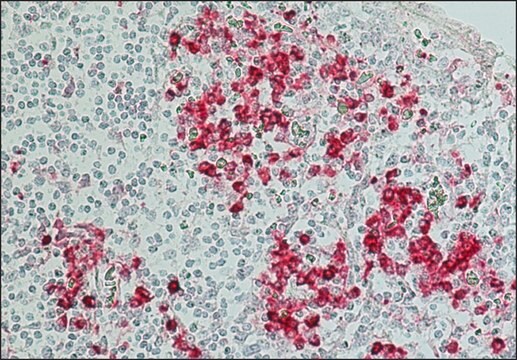K3502
Anti-Human Kappa Light Chain (Bound and Free) antibody produced in goat
affinity isolated antibody, lyophilized powder
Se connecterpour consulter vos tarifs contractuels et ceux de votre entreprise/organisme
About This Item
Produits recommandés
Source biologique
goat
Niveau de qualité
Conjugué
unconjugated
Forme d'anticorps
affinity isolated antibody
Type de produit anticorps
secondary antibodies
Clone
polyclonal
Forme
lyophilized powder
Technique(s)
quantitative precipitin assay: suitable
Température de stockage
2-8°C
Modification post-traductionnelle de la cible
unmodified
Informations sur le gène
human ... IGK@(50802)
Vous recherchez des produits similaires ? Visite Guide de comparaison des produits
Description générale
Anti-Human κ Light Chain (bound and free) antibody is obtained from goat antiserum. Immunospecific purification removes all goat serum proteins and immunoglobulins that do not bind to the κ light chain (bound and free). The antibody preparation is specific for κ light chains when tested against bound and free light chains. The product shows no reaction with bound or free λ light chains.
Immunogène
Purified human normal and myeloma κ light chain
Application
Anti-Human κ Light Chain (Bound and Free)-FITC antibody was used for as secondary antibody in ELISA at a working antibody dilution of 1:200 using maize seed extracts. For ELISA using NSO/1 myeloma cells, HEK293 cells and mouse plasma, antibody concentration of 1-2 μg/ml was used. The antibody was also used to coat the electrode surface in the preparation of antiatrazine immunosensor.
Anti-Human Kappa Light Chain (Bound and Free) antibody produced in goat has been used in western blotting.
Forme physique
Lyophilized from 0.01 M sodium phosphate, 0.015 M sodium chloride, pH 7.2
Reconstitution
Reconstitute with 0.135 M sodium chloride.
Clause de non-responsabilité
Unless otherwise stated in our catalog or other company documentation accompanying the product(s), our products are intended for research use only and are not to be used for any other purpose, which includes but is not limited to, unauthorized commercial uses, in vitro diagnostic uses, ex vivo or in vivo therapeutic uses or any type of consumption or application to humans or animals.
Vous ne trouvez pas le bon produit ?
Essayez notre Outil de sélection de produits.
Faites votre choix parmi les versions les plus récentes :
Déjà en possession de ce produit ?
Retrouvez la documentation relative aux produits que vous avez récemment achetés dans la Bibliothèque de documents.
Les clients ont également consulté
Characterization of immunological interactions at an immunoelectrode by scanning electron microscopy
Ambrosi A et al
Electroanalysis, 19, 244-252 (2007)
Yvonne J Rosenberg et al.
PloS one, 11(3), e0152760-e0152760 (2016-04-01)
Intravascular delivery of broadly neutralizing antibodies (bnAbs) has shown promise for prevention and treatment of HIV infection. However, multiple IV administrations in geographic locations with poor accessibility to medical care have practical limitations. We have assessed the efficacy of plant-derived
Yvonne Rosenberg et al.
PloS one, 8(3), e58724-e58724 (2013-03-28)
Passive immunotherapy using anti-HIV broadly neutralizing monoclonal antibodies (mAbs) has shown promise as an HIV treatment, reducing mother-to-child-transmission (MTCT) of simian/human immunodeficiency virus (SHIV) in non-human primates and decreasing viral rebound in patients who ceased receiving anti-viral drugs. In addition
Ruben J Boado et al.
Biotechnology and bioengineering, 96(2), 381-391 (2006-08-29)
A murine monoclonal antibody (MAb) to the human insulin receptor (HIR) has been engineered for use as a brain drug delivery system for transport across the human blood-brain barrier (BBB). The HIRMAb was humanized by complementarity determining region (CDR) grafting
S M Chamow et al.
Journal of immunology (Baltimore, Md. : 1950), 153(9), 4268-4280 (1994-11-01)
HIV infection depletes the immune system of the coordinating functions of CD4+ T cells and APCs, whereas the population of CD8+ CTLs remains largely intact: functional but undirected. We have developed a humanized bispecific immunoadhesin-antibody (BIA) that redirects these remaining
Notre équipe de scientifiques dispose d'une expérience dans tous les secteurs de la recherche, notamment en sciences de la vie, science des matériaux, synthèse chimique, chromatographie, analyse et dans de nombreux autres domaines..
Contacter notre Service technique